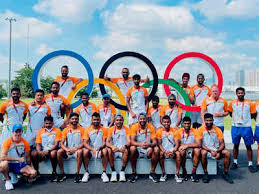How India can be Olympics-ready
With great cultural diversity and projected economic might on its side, India will stake a formidable claim to hosting the 2036 Olympics. But the country will also need to convince the International Olympic Committee that it can deliver a seamless Games. The letter of intent submitted last month will be scrutinised not merely for the capacity to translate on the ground fancy stadium designs, but also on India’s ability to wear the cosmopolitan garb with ease, making the country feel welcoming to athletes and spectators around the world. India has a magnificent opportunity to get its house in order, and make bold strides.
India will need to acquire and hone the professional abilities to host the best levels of competition in various sports. The logistics of athlete accommodations, equipment quality controls, transport systems, upskilling of technical officials, besides raising athletes’ performance in near-alien sports, will be a massive challenge. Every Games is judged on the ability of hosts to stay invisible and efficient, and India will need serious repairing of its poor reputation on punctuality and cleanliness. Its record in ensuring comfort for spectators has been suspect in cricket, and that aspect will need to be upgraded drastically. Also, while stadium aesthetics look pretty in PowerPoint presentations and 3D printing, leaking roofs or sub-par sustainability goals in construction won’t help in India making the cut.
Climate change poses large challenges for any host, but more so for India where quality of roads and construction will need tighter quality checks, given how flooding lashed top cities and wreaked havoc earlier this year, for instance. Six medals just 12 years before the proposed Olympics also point to the need for serious intervention and plans on imminent funding cuts don’t bode well for the country. Ultimately, the Olympics are a sporting event, promoting amity and peace, so efforts will need to be made to send out the message that there will be zero tolerance for those who take the law into their own hands, or seek to cramp the rights and freedoms of others. India’s leadership in promoting a multipolar world has been exemplary, and it holds a unique place as a big country not reviled by the under-developed world, or resented by the big powers. But ultimately, Olympics will be about that wooden floor board not coming undone and the roof not leaking onto the field of play, and athletes reaching the venues on time. India can pull off the fancy, but it will also need to ace the basics.
